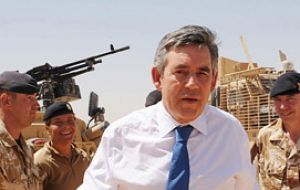MercoPress. South Atlantic News Agency
PM Brown hints to earlier-than-expected withdrawal from Afghanistan
 The plan is to boost the Afghan army expansion from 2011 to next year
The plan is to boost the Afghan army expansion from 2011 to next year UK Prime Minister Gordon Brown paved the way for an earlier-than-expected withdrawal of British troops from Afghanistan as he called for training of Afghan forces to be accelerated.
The Prime Minister used a major policy speech to propose bringing forward a key Nato target to expand the Afghan army to 134,000 troops from 2011 to next year. But he made no reference to Thursday night's shock protest resignation of Labour MP Eric Joyce, who had been an aide to Defence Secretary Bob Ainsworth.
Addressing the International Institute for Strategic Studies in London, Mr Brown insisted the military campaign was crucial to protect the public in this country and said the UK could not simply “walk away”. He did not set out a timetable for pulling out British troops, but suggested that transferring responsibility for security to the Afghans would allow the reduction of UK forces.
“I think the issue is how fast you can move on this. What we are saying today is that we are going to move faster,” he said.
Nato announced in the spring that it would support the expansion of the Afghan army from 80,000 to 134,000 by November 2011. Mr Brown said Britain would welcome a more ambitious target of achieving the goal of 134,000 by November 2010, which would require increasing the rate of training from 2,000 to 4,000 new troops per month.
To achieve this he proposed a shift from mentoring Afghan forces to partnering them, meaning that the bulk of British combat troops would eat, sleep and fight side-by-side with their Afghan counterparts.
He said: “If, as I say, Afghan forces can take more responsibility for the functions of security in the different parts of Afghanistan, and if perhaps we consider transfers of responsibility of government district by district or province by province, then it is possible to envisage that, as the number of Afghans taking responsibility grows and the quality of their leadership grows, we can reduce the numbers of our forces.
”That is the basis of our strategy and it is the basis of the American strategy as well. I can be time-specific about the build-up of Afghan forces that we are trying to achieve. When we see the quality of the effort, and when we are assured responsibility can be taken, that is the point at which we can say the need for British troops is a great deal less.”




Top Comments
Disclaimer & comment rulesCommenting for this story is now closed.
If you have a Facebook account, become a fan and comment on our Facebook Page!